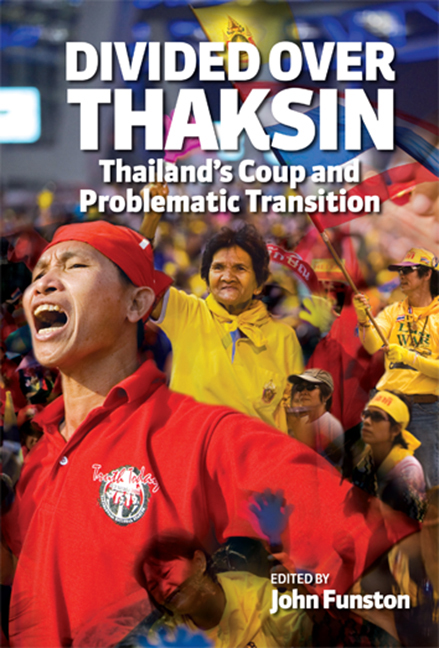Book contents
- Frontmatter
- Contents
- List of Tables and Figures
- List of Contributors
- Preface
- Introduction
- 1 Political Contests in the Advent of Bangkok's 19 September Putsch
- 2 The Tragedy of the 1997 Constitution
- 3 The NESAC, Civil Society, Good Governance and the Coup
- 4 Military Coup and Democracy in Thailand
- 5 Deconstructing the 2007 Constitution
- 6 Thailand's 2007 Constitution and Re-Emerging Democracy: Will Political Polarization Continue?
- 7 Untying the Gordian Knot: The Difficulties in Solving Southern Violence
- 8 Another Country: Reflections on the Politics of Culture and the Muslim South
- 9 Governance in the South: Is Decentralization an Option?
- 10 Tradition and Reform in Islamic Education in Southern Thailand
- 11 The Economy under the Thaksin Government: Stalled Recovery
- 12 The Thai Economy after the Coup
- 13 The Impact of Political Uncertainty on Business
- Index
13 - The Impact of Political Uncertainty on Business
Published online by Cambridge University Press: 21 October 2015
- Frontmatter
- Contents
- List of Tables and Figures
- List of Contributors
- Preface
- Introduction
- 1 Political Contests in the Advent of Bangkok's 19 September Putsch
- 2 The Tragedy of the 1997 Constitution
- 3 The NESAC, Civil Society, Good Governance and the Coup
- 4 Military Coup and Democracy in Thailand
- 5 Deconstructing the 2007 Constitution
- 6 Thailand's 2007 Constitution and Re-Emerging Democracy: Will Political Polarization Continue?
- 7 Untying the Gordian Knot: The Difficulties in Solving Southern Violence
- 8 Another Country: Reflections on the Politics of Culture and the Muslim South
- 9 Governance in the South: Is Decentralization an Option?
- 10 Tradition and Reform in Islamic Education in Southern Thailand
- 11 The Economy under the Thaksin Government: Stalled Recovery
- 12 The Thai Economy after the Coup
- 13 The Impact of Political Uncertainty on Business
- Index
Summary
During the political turmoil of 2006–07, a great deal of media and other expert attention has focused on the effects political instability might have on the business community. This chapter is an attempt to provide insights into business perceptions, from a member of Thailand' foreign business community.
It is difficult to generalize because there are a range of experiences. Some businesses have been in Thailand thirty years or more, and seen such instability before, while others have been there for quite a short period of time, and could be fazed by the events. It was some time ago (perhaps twenty years) that I was with some very senior Thai business people, and as we drove past a military establishment, I made some comment about military coups. The response, after the initial deathly silence was: “Mr Robinson, we in Thailand have a coup on the first Tuesday of each month. It starts at 11 a.m. and must be finished by lunchtime.” Such was the frequency of coups at that time, and the lack of gravity with which they were viewed.
However in the current life of most investors, they do not know of coups, nor that they have generally been conducted with gentlemanly observance of other peoples’ rights. The most recent coup occurred over fifteen years ago, in February 1991. Moreover, a high level of political uncertainty and actual machinations surrounded the September 2006 coup, sufficient to make Machiavelli look almost amateurish. So it was with great relish and some enthusiasm that I thought I should undertake the project of trying to establish what the current view of the foreign business community has been.
I thought that I would take my lead from attitudes of Thailand' English language newspapers. These can be taken to reflect the perceptions of the local and foreign business community, including the foreign business chambers, and Australia and other Western governments.
The effects of those attitude changes are to be measured against the factors below which I have called the “reality”:
• Inward foreign direct investment (FDI), which shows the actual funds being invested in (mainly) capital works, but certainly in ventures in which the capital is not liquid and not very mobile.
• Applications to the Board of Investment (BOI), which is very current and reflects the “up to the minute” thinking of potential investors.
• Actual tourist numbers from Australia.
- Type
- Chapter
- Information
- Divided Over ThaksinThailand's Coup and Problematic Transition, pp. 189 - 198Publisher: ISEAS–Yusof Ishak InstitutePrint publication year: 2009

